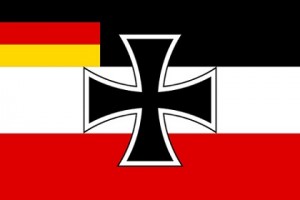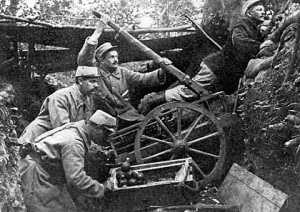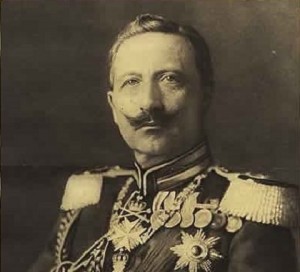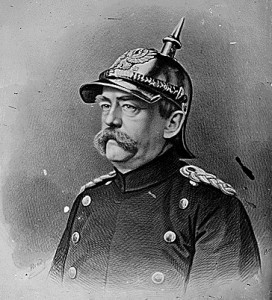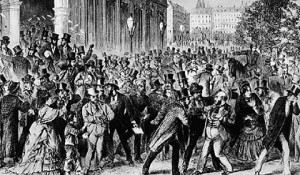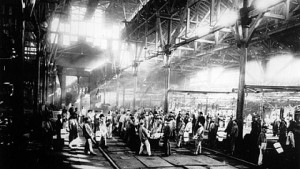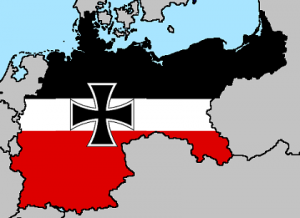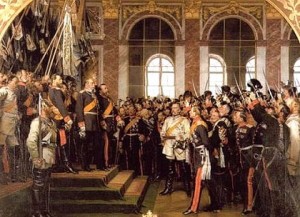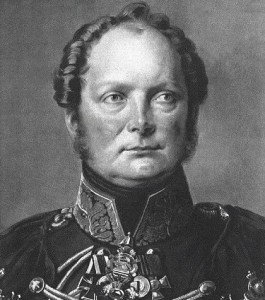The Weimar Republic, proclaimed on November 9, 1918, was born in the throes of military defeat and social revolution. In January 1919, a National Assembly was elected to draft a constitution. The government, composed of members from the assembly, came to be called the Weimar coalition and included the SPD; the German Democratic Party (Deutsche … [Read more...]
Germany in World War I
Germany's leadership had hoped for a limited war between Austria-Hungary and Serbia. But because Russian forces had been mobilized in support of Serbia, the German leadership made the decision to support its ally. The Schlieffen Plan, based on the assumption that Germany would face a two-front war because of a French-Russian alliance, required a … [Read more...]
Foreign Policy in the Wilhelmine Era
Foreign policy in the Wilhelmine Era (1890-1914) turned away from Bismarck's cautious diplomacy of the 1871-90 period. It was also marked by a shrill aggressiveness. Brusque, clumsy diplomacy was backed by increased armaments production, most notably the creation of a large fleet of battleships capable of challenging the British navy. This new … [Read more...]
Bismarck’s Foreign Policy
The crash of 1873 and the subsequent depression began the gradual dissolution of Bismarck's alliance with the National Liberals that had begun after his triumphs of 1866. In the late 1870s, Bismarck began negotiations with the economically protectionist Conservative Party and Center Party toward the formation of a new government coalition. … [Read more...]
The Tariff Agreement of 1879 in Germany and Its Social Consequences
Germany experienced an economic boom immediately after unification. For the first time, the country was a single economic entity, and old impediments to internal trade were lifted. The federal chancellery published a new commercial code and established a uniform currency. The indemnity that France had to pay Germany after losing the 1870-71 war … [Read more...]
The Economy and Population Growth in Germany
Germany experienced an economic boom immediately after unification. For the first time, the country was a single economic entity, and old impediments to internal trade were lifted. The federal chancellery published a new commercial code and established a uniform currency. The indemnity that France had to pay Germany after losing the 1870-71 war … [Read more...]
Political Parties in Imperial Germany
The German Empire--often called the Second Reich to distinguish it from the First Reich, established by Charlemagne in 800--was based on two compromises. The first was between the king of Prussia and the rulers of the other German states, who agreed to accept him as the Kaiser (emperor) of a united Germany, provided they could continue to rule … [Read more...]
Imperial Germany – the Second Reich
The German Empire--often called the Second Reich to distinguish it from the First Reich, established by Charlemagne in 800--was based on two compromises. The first was between the king of Prussia and the rulers of the other German states, who agreed to accept him as the Kaiser (emperor) of a united Germany, provided they could continue to rule … [Read more...]
Bismarck and the Unification of Germany
Liberal hopes for German unification were not met during the politically turbulent 1848-49 period. A Prussian plan for a smaller union was dropped in late 1850 after Austria threatened Prussia with war. Despite this setback, desire for some kind of German unity, either with or without Austria, grew during the 1850s and 1860s. It was no longer a … [Read more...]
The Restoration of Germany
Within just a few months, liberal hopes for a reformed Germany were disappointed. Conservative forces saw that the liberal movement was divided into a number of camps having sharply different aims. Furthermore, the liberals had little support left among the lower classes, who had supported them in the first weeks of the revolution by constructing … [Read more...]
- « Previous Page
- 1
- …
- 5
- 6
- 7
- 8
- 9
- …
- 13
- Next Page »
